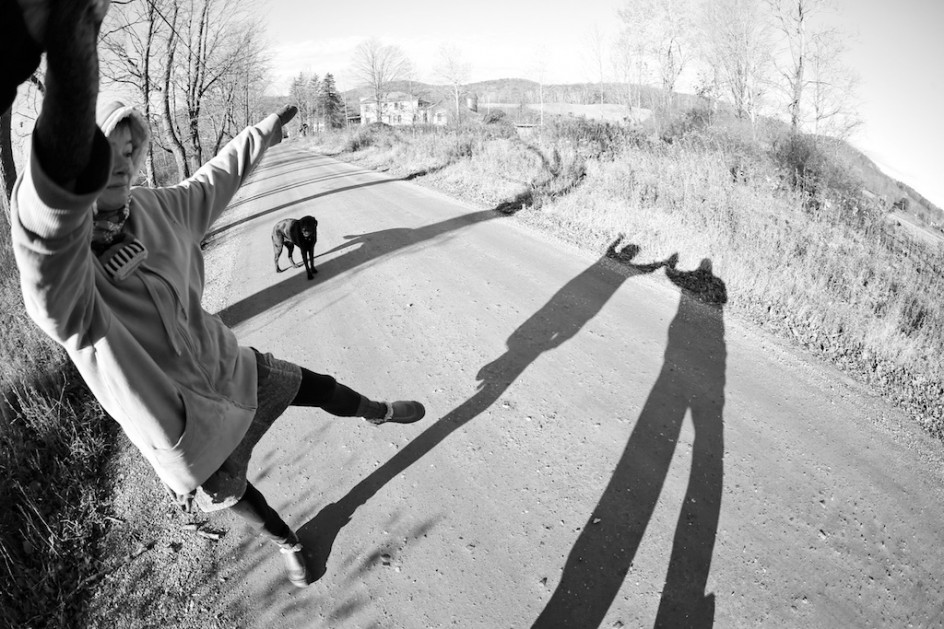
Maria invited me to dance with shadows again this morning, and I gratefully accepted, we did a little kind of quick-step right there on the road, Lenore was mystified but interested. This is a fine way to begin a day.
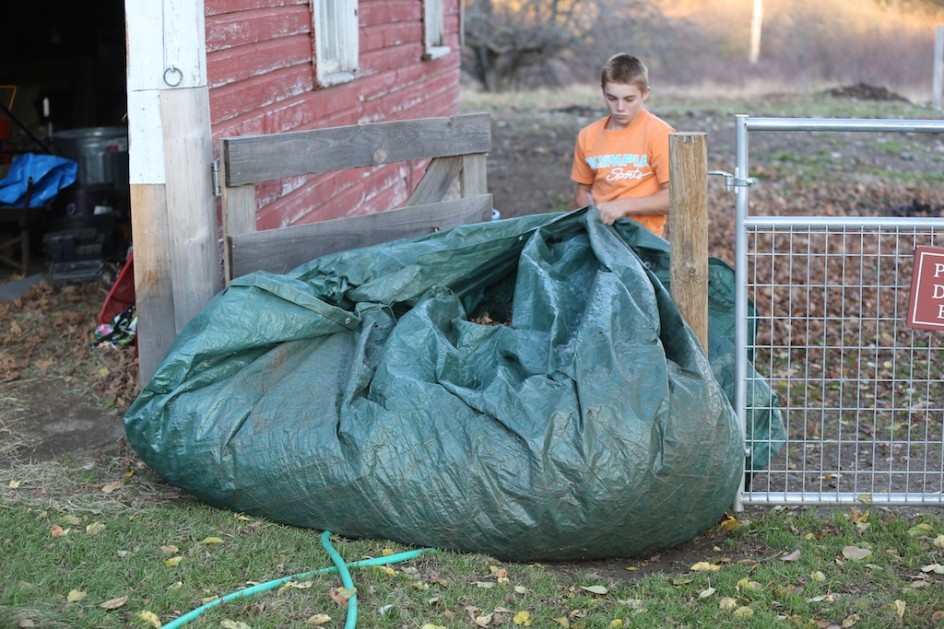
Tyler came over this afternoon to haul the last of the leaves out into the pasture, where he spreads them around. He is one of the hardest workers I have ever seen, he’s been working on our leaves for about a week, coming over in the afternoons. He has taken such a load off me this summer, I think Joseph Campbell was right, magical helpers appear when you most need them. I expect to mow the lawn myself next year, I missed doing it, but there are plenty of things for Tyler to do, even through the winter.
We love having him around, he is a rare human being. He is also an animal lover, he loves to throw sticks for Lenore and visit with Simon. He says he hopes to come to Hubbard Hall and see my play in January, I hope he makes it. It is uplifting to see somebody with such a passion and focus for work, and he is strong and tireless.
I will enjoy watching him move into his life. He has a lot of poise and presence for a 13-year-old. We had a great time with him this summer, he has a quick wit and a ready smile. He reminded us that he is available to work in the winter and he has a snowmobile. Believe me, I said, you will be hearing from us.
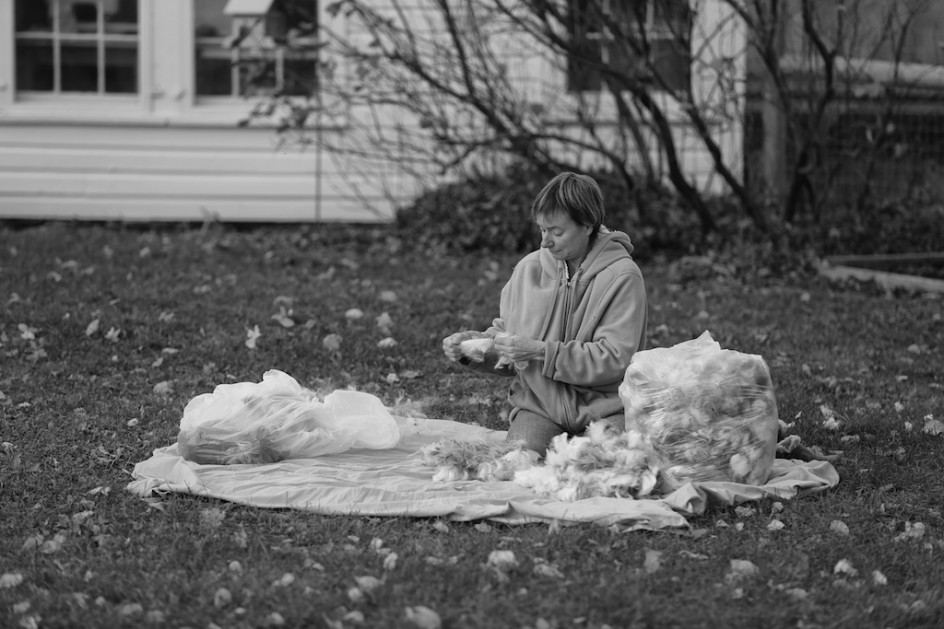
Maria has been skirting wool in the afternoon, we want to take it to Brandon, Vt. this weekend and drop it off at the mill there, it will take between six and eight months to get it back. Today, Maria did Deb’s wool, lots of burrs, lots of good wool. Maria sells the yarn and the roving. Two more to go, Ma and Liam. Ma will be a mess, she is always wandering around alone, covered in burrs and crud. She may be the dumbest sheep I ever saw, or she might be profoundly spiritual.
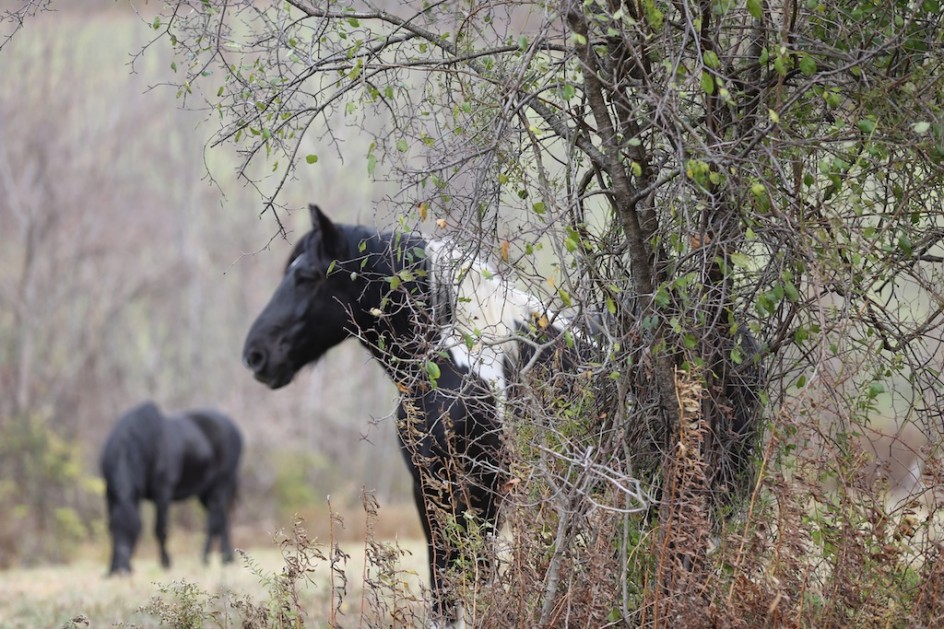
Out the window, on the way to cardiac rehab, I pass a farm with some beautiful horses out in the pasture. Today I couldn’t resist stopping, horses, like cows and donkeys, are intensely curious, they all came over to check out the stranger with the camera.
I loved in cities for a long time, I can no longer live in a place where I can’t look out of the window and see things like this. The horses have a dignity and timelessness to them, everyone should get to see them.
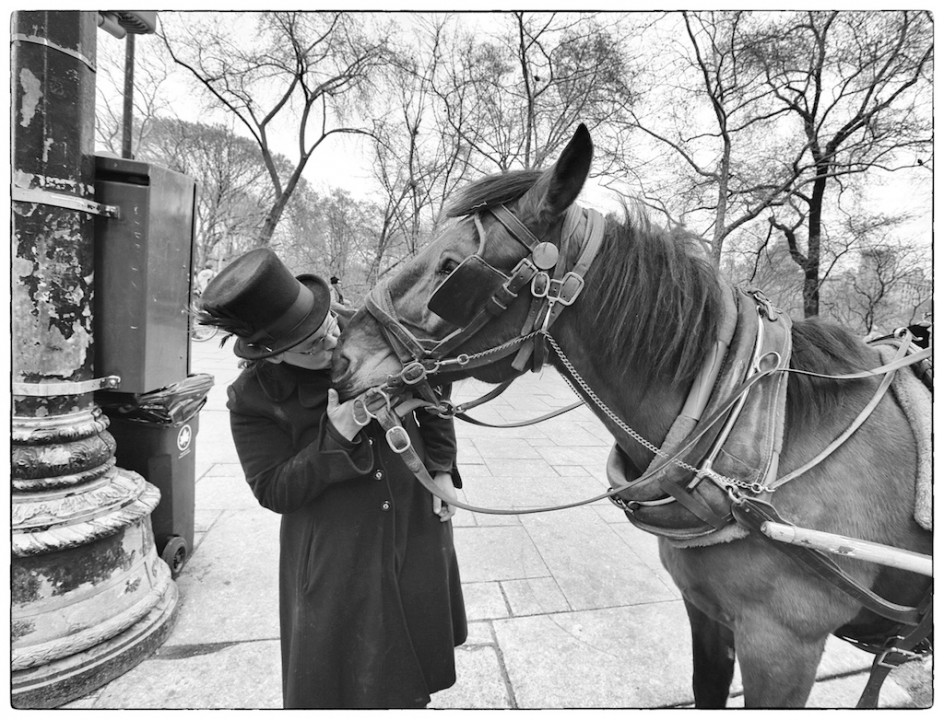
On of the first things that struck me about the effort to ban the carriage horses from New York was this very obvious and poignant truth: the people seeking to exile the horses do not seem to love them very much or know them, the people who are accused of abusing and mistreating them love them very much and know them well.
The mayor, the City Council President, the leaders and spokespeople for the animal rights groups demanding that the carriage trade be shut down – do not have animals, want to be around them, touch them, visit them, speak to them or seem to know much about them. The mayor has never owned an animal, not even a dog or a cat, or been near a horse, but he insists it is immoral for horses to pull carriages in New York.
The City Council President, who supports the ban on the horses, says she can speak for them because she has a rescue cat.
The animal rights organizations and protestors, who seem to think that dogs and human children have the same needs and desires, mostly live in apartments in Brooklyn and Queens. They have never visited the stables, touched a horse, given one a carrot or brushed one, or spoken to a carriage driver. There is no love or compassion in their accusations or behaviors, a frightening omen for the animals they profess to speak for.
More than anything else, they are eerily evocative of Cinderella’s stepsisters, snarling and scheming. I would not care for them to speak for the rights of my dog or my donkeys.
One of the first things that struck me and almost everyone else who has visited the carriage stables is that the drivers and owners appear to love the horses very much. They are always – in the stables and on the streets – kissing them, brushing them, touching them, joking and singing with them, talking to them in the endearing, even foolish ways that are deeply familiar to anyone who loves animals or who has been around them.
There is nothing worse for a true animal lover than to be accused of abusing his or her animal, it is the most painful thing to witness in this unnecessary controversy.
You can conduct your own test, go and ask a carriage driver about his horse, and you will see smiles, hear stories, tales and memories. These horses are not pets to the carriage drivers, they are not furbabies, they are partners on the earth, they share the joys and travails of life. They are very much loved, every one who has seen them together knows it. Taking an animal away from a human partner, in love, work or life against the will of either is a profoundly cruel thing to do in the name of love. It is an abuse of the very word.
I have written a dozen books about animals, lived with them for many years, spend much of each day with them. It is the easiest thing in the world to spot an animal who has been mistreated, it is even easier to recognize one who has been loved.
To a horse, says Buck Brannaman, the country’s leading horse trainer (and an advocate for the carriage trade) a mountain lion jumping on his back is the same thing as a human climbing on. Anything jumping on a horse’s back or approaching them with instruments is potentially frightening. The carriage horses are not frightened of their drivers. That is because they have learned to trust them, and been treated well by them, they can be mounted, brushed, harnessed, walked and handled.
As Brannaman has pointed out in his books and many interviews, and as any true animal lover knows, working animals love to be loved, to work with people, to be spoken to, handled, brushed, groomed and fed. They love to work. My donkeys line up every morning to be groomed, and if you have ever seen a donkey who has been truly abused – I own one and have seen many – they will not come near a human being with a brush or a harness.
Love and work are one and the same thing to working animals, and most animals – horses especially, dogs too – are acutely sensitive to being abused or mistreated, they are fearful, aggressive, resistant to handling and commands, cowering and shy. A vet can spot an abused animal in a second, a score or more vets have been to the carriage stables in New York this year alone and pronounced the animals there healthy and content.
The carriage horse controversy has drawn worldwide attention to questions of rights for animals, their future in our world, and who gets to speak for them.
I believe animals have the right to be loved, not simply driven from lives with people and among human beings. If the horses trust their driver, the ideologues in the animal rights movement do not seem to trust human beings to care for the animals remaining on the earth. How ironic that horses can trust but people cannot. Animals that work are cared for and survive, animals that don’t have work and connections with human beings vanish, especially working animals.
Animals have the right to have their fates and futures decided by people who know and love them, not political ideologues who are disconnected both from the animal world and the human world.
When I saw how much the carriage drivers loved their horses, I saw that a great injustice was being done, perhaps by well-meaning people who are simply ignorant about the needs of animals. Perhaps by people who are not so well-meaning and seem unable to love either humans or animals.
When it comes to animals, love matters, it is more important than any other factor regarding their care, rights and welfare.
The New York Carriage Horses are loved. In a rational world, this false controversy would end right there.
__
My new e-book, “Who Speaks For The Carriage Horses: The Future Of Animals In Our World” is available for $3.99 everywhere digital books are sold.